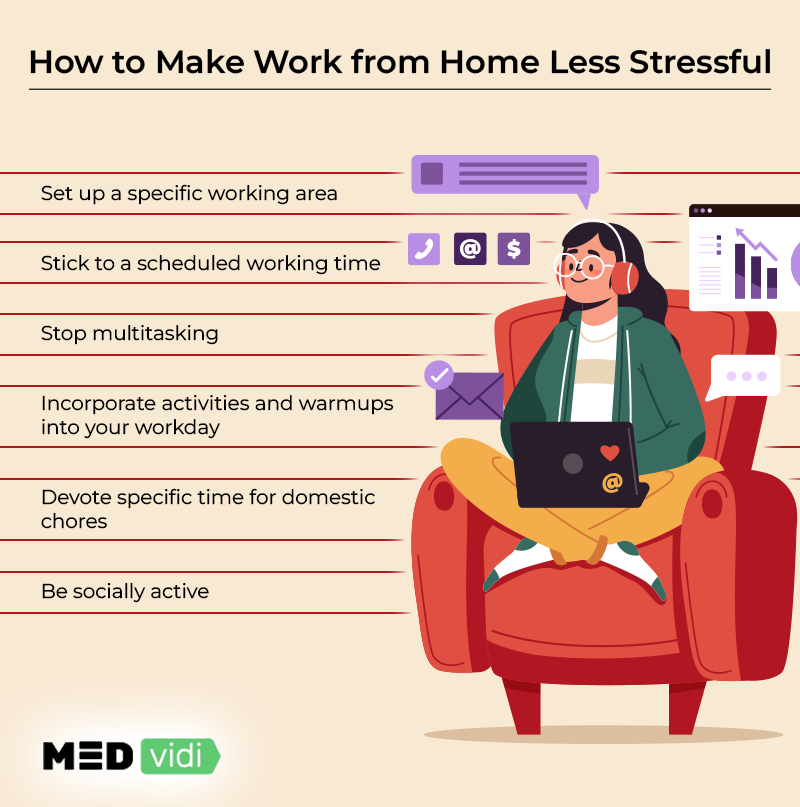Many of us have experienced what it’s like to work remotely from home during the COVID-19 time. For many, remote employment has been a blessing. Saving time and money on the lengthy commute to work meant spending more quality time with loved ones.
More and more people are requesting remote work options or looking for positions that allow them to work from home. They think that it promotes greater autonomy and a better work-life balance. However, there are not only pros but also cons of working from home, just like every practice. This article explains how working remotely affects mental health positively and negatively.
Feeling mentally disturbed? Whenever you need us, we are here to help.
Does Working from Home Reduce Workplace Stress?
Working from home is a fantastic way to avoid the noise and turmoil of a standard office setting. Such distractions make some people constantly stressed and tired, their blood pressure surges, and they can’t stay focused for a long time. On the contrary, working from home comes with the next benefits:
- You have more chances to follow a healthy lifestyle.
- You are not distracted by co-workers, so your productivity might improve.
- You can adjust your sleeping schedule since you don’t have to spend time on travel, so your sleep can also improve.
- You get more leisure time to pursue hobbies.
- You maintain your work/life balance better.
Remote Work and Mental Health: Risks Associated
Despite some benefits, there are also challenges of working from home. If you cannot establish a schedule that works for you, find it difficult to draw a line between work and home life, or feel lonely, the decision to work from home may have a detrimental effect on your mental health.
If you work from home, you may be more likely to encounter these problems, which could negatively affect your mental health:
- The need for more room to set up a comfortable working area.
- The need for better Internet connection.
- Being sidetracked by family members or domestic noises.
- Feeling cut off professionally and socially, feeling isolated from the coworkers and the company as a whole.
- Being uncertain regarding your professional performance and professional development.
- Finding it difficult to distinguish between work and personal time, which could result in burnout.
- Lacking a sense of teamwork.
- Failing to prioritize work and having uncertain hours of labor.
People working from home for a long time can also have a higher risk of experiencing lethargy, anxiety, depression, and stress.
We will work with you to pinpoint the primary sources of your stress and create a customized plan for you to overcome it.
Working-from-Home Depression
Working from home may impact a person’s mental health depending on a few different variables, such as financial instability, job insecurity, loneliness, and others. According to a 2021
- a reduction in physical activity;
- unhealthy diet;
- being a toddler’s parent or carer;
- a greater number of distractions at home;
- an absence of collaboration with colleagues.
The sense of loneliness significantly contributes to the tension and anxiety that accompany working from home. In addition, loneliness is one of the key causes for many workers to feel depressed. Therefore, people must ensure they have a way to interact with others while they work remotely.
According to the findings of a 2022

Strategies for Improving Remote Workers’ Mental Health
The following tips can assist you in preventing work-related stress from negatively affecting your mental health.
- Set up a specific working area. A working area can increase your productivity and provide you comfort.
- Stop multitasking. The
research[3] shows that working on multiple tasks simultaneously, especially complicated ones, reduces productivity. - Stick to a scheduled working time. Working on the same schedule helps you create a stable work routine and develop time management skills.
- Plan time for tasks that require much concentration while you’re more alert and productive.
- Incorporate activities and warmups into your workday because sitting for hours harms your health.
- Remain socially active.
Research[4] indicates encouraging and supporting social activities for individuals may positively impact their cognitive health in the future. - Devote specific time for domestic responsibilities.
Is there an increase in depression? For medication or psychiatric assistance, visit a doctor.
In Summary
It’s possible that while working from home, you still don’t have a reliable routine or a successful work-life balance. In addition, long-term stress has a high propensity to progress to more severe mental health issues. Speaking with a healthcare expert could be beneficial if you frequently feel overwhelmed or exhibit signs of anxiety or depression.












